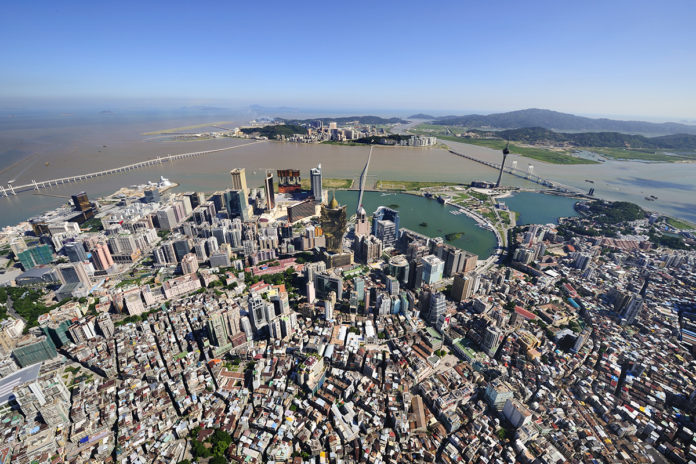Galaxy Entertainment Group Ltd plans to invest HK$16 billion in the second phase of its Cotai project By Sara Farr Pile driving operators are already working on the deep foundations for phase two of Galaxy Macau in Cotai, which will virtually double the size of the property to 1 million square metres. Galaxy Entertainment Group Ltd announced late last month that it would invest HK$16 billion (US$2.1 billion) in the project’s second phase, with a scheduled completion for mid-2015. Company executives expect it to be “significantly accretive” to the group’s earnings. “We have decided to accelerate the rollout of phase two based on the success of phase one,” said Lui Che Woo, the chairman of Galaxy Entertainment Group. Phase one cost HK$16.5 billion and opened in May last year. The project helped the gaming operator more than triple its profits for 2011. The property’s second phase will be funded, according to Galaxy’s president and chief operating officer Michael Mecca, through a combination of existing cash, cash from operations and debt. “We do not intend to issue equity,” he told a media conference in Hong Kong. According to Mr Mecca, Galaxy Entertainment Group has HK$7.7 billion cash in hand. The new tower included in phase two of Galaxy Macau, along with the existing two, will only use around 50 percent of the total land area Galaxy Entertainment Group owns in Cotai. “That leaves plenty of room for further development,” Mr Mecca said. Phase two will have the capacity for up to 500 gaming tables and 1,000 slot machines. Galaxy Macau currently has around 450 tables and 1,500 slots. In addition to enlarging the gaming space, the retail boulevard will be expanded to more than 100,000 square metres to accommodate around 200 luxury stores, an increase of 160 shops. Food and beverage outlets will double to more than 100. Hotel partners Galaxy’s executives hope the property’s second phase will benefit from increased visits to Macau as major infrastructure developments in the mainland improve accessibility. That includes the expansion of the border checkpoints in Macau and Zhuhai and the construction of the Hong Kong-Zhuhai-Macau Bridge, among others. “These developments will serve as a catalyst for future growth and diversification of Macau’s tourism and leisure market,” Mr Lui said. To complement phase one, phase two will offer a 250 all-suite hotel by Ritz-Carlton and what is set to be the world’s largest JW Marriott hotel with about 1,100 rooms. Marriott International Inc owns both brands and these will be its two first properties in Macau, operated under a long-term management agreement inked with Galaxy. Together with the three hotels from phase one, Galaxy Macau will offer 3,600 rooms, suites and villas after phase two is completed. “The Asia-Pacific region and China, in particular, are Marriott’s fastest growing markets,” said Paul Foskey, the group’s Asia-Pacific executive vice president of hotel development. “We wanted to make sure that we were partnering with the best location in the market,” he added. On track Grant Govertsen from research and equity firm Union Gaming says this is a “very exciting” time for Galaxy Entertainment Group and its investors. The gaming concessionaire is moving forward for a second development in Cotai as other casino operators, namely SJM Holdings Ltd and MGM China Holdings Ltd, are still waiting to get in. Union Gaming analysts estimate Galaxy Macau phase two is worth HK$6-plus on share value for Galaxy Entertainment Group. Just a few days ahead of announcing phase two, the gaming operator had already surpassed Wynn Resorts Ltd in terms of market value, with its shares soaring over 4,300 percent in less than four years. Galaxy Entertainment Group, which has a market capitalisation of US$12 billion, surpassed SJM Holdings Ltd by late March, according to data from Bloomberg. Mr Govertsen says he does not think announcing a floor capacity of up to 500 gaming tables and 1,000 slot machines for Galaxy Macau phase two is “optimistic”. Once the property does open in mid-2015, the new cap on the number of live gaming tables will already be in place. It allows for an average growth of 3 percent per year in the number of tables, meaning up to 510 new tables between 2013 and 2015. Union Gaming analysts also believe the table cap is somewhat flexible and subject to possible waivers based on prevailing supply and demand trends. “So there will be several gaming tables available. Galaxy might well be the first in line to claim those tables,” Mr Govertsen says.
—
























